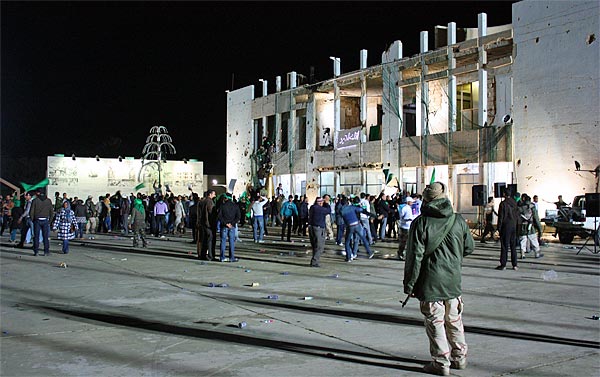The U.S. and its allies expand their strikes, one of which hits Kadafi’s compound in Tripoli. The Obama administration struggles to define its goals and its role in the attacks.
By Borzou Daragahi and Brian Bennett, Los Angeles Times
The second day of the Western military campaign against Moammar Kadafi saw an escalation of attacks, with bombing raids against ground forces loyal to the Libyan leader — and an escalation of questions on the strikes’ objective and the extent of the U.S. role.
As U.S. officials said that Kadafi was not being targeted in a campaign that has seen his air defenses blasted by cruise missiles, a structure in his massive compound in the Libyan capital, Tripoli, was hit in a missile strike late Sunday.
With antiaircraft fire lighting up the sky, journalists were led to a bus after midnight and driven to the Bab Azizia compound, whose barracks-style buildings, barbed wire and hundreds of young militiamen brandishing semiautomatic weapons give it the look of a Tripoli “Green Zone.”
Just 100 yards from the residence that President Reagan bombed a quarter-century ago, and 50 yards from the tent where the flamboyant leader receives dignitaries, a three-story complex had become a mound of wiring and tangled concrete. Metal girders stuck out from where the missile had sheared through the structure.
Journalists rummaging through the wreckage found guidance and control parts consistent with a U.S.-made cruise missile. One piece said it had been manufactured in 2006.
“This attack was in contradiction to what the Americans and others have been saying, that it’s not a priority to hit the leader,” government spokesman Musa Ibrahim said as crowds of Kadafi supporters chanted, “Down, down, U.S.A.,” and, significantly, “Death to Sarkozy,” the French leader who has taken a very public role in the campaign.
Asked about the strike, Vice Adm. William E. Gortney told reporters, “At this particular point I can guarantee he is not on the targeting list.”
In a briefing at the Pentagon, he said it was possible Kadafi could be hit “if he happens to be in a place inspecting a missile site and we don’t have any idea he is there at the time” but that “we are not targeting his residence at this time.”
After the initial bombardments, the leader of the Arab League, Amr Moussa, called the overnight campaign “excessive.” At the same time, however, Arab League member state Qatar was moving fighter jets into position to begin flights patrolling over Libya.
In Brazil with President Obama, national security adviser Tom Donilon said the U.S. military role is “very specific,” involving a limited action meant to protect Libyan civilians from Kadafi’s forces, which have been advancing on the eastern rebel stronghold of Benghazi.
The near-term goal of the military exercise is not to force Kadafi from power, White House officials said. Rather, the administration hopes to “squeeze” him by isolating him diplomatically, peeling away his support and imposing sanctions on his regime, they said.
It was only last summer that the U.S. declared an end to combat operations in Iraq. In Afghanistan, where the U.S. is leading a nearly 10-year war that recent polls show most Americans feel is no longer worth fighting, Obama has approved a plan to keep fighting until at least 2014, with no guarantee that by then the government in Kabul can handle security in the country.
But faced with the prospect of a humanitarian disaster at Kadafi’s hands, Obama found himself in the uncomfortable position he has spent weeks trying to avoid: that of world policeman.
On Sunday, Republican House Speaker John A. Boehner asked Obama to clarify his objectives in Libya. “Before any further military commitments are made, the administration must do a better job of communicating to the American people and to Congress about our mission in Libya and how it will be achieved,” Boehner said in a statement.
Indiana Republican Sen. Richard G. Lugar repeated his call for a declaration of war by Congress that would lay out a plan for the operations. “There always ought to be a plan for what is going to proceed,” said Lugar, citing polls that the American people don’t want to take on more expensive challenges when the nation is already struggling with the budget, deficits and the economy. One problem the administration faces is that even though Obama wants the U.S. to play a supporting role in Libya — and, indeed, the first strike came from a French fighter jet — only the United States has the resources to launch the complex operations to clear Kadafi’s air defenses.
But details about when and how the U.S. will hand over leadership of the operation were elusive.
“We do not know when we will be ready to do that [hand over command] and we do not know what that structure will look like,” Gortney said. “We are working very hard to define it.”
Defense Secretary Robert M. Gates said Sunday that there were a couple of possibilities for future leadership of the campaign. “One is British and French leadership. Another is the use of NATO machinery,” Gates told reporters as he flew to Russia.
Whether the United States would take further steps to assist the rebels in Libya “remains to be seen,” said Gates, who added that a partitioning of Libya would only contribute to “enduring instability” in the region. The rebels had swept westward from their eastern base before being chased back to Benghazi by forces loyal to Kadafi.
The U.S. and its allies had made the calculation that a failure to intervene could mean a slaughter of civilians in Benghazi, home to 700,000 and Libya’s second-largest city, and escalated the attacks beyond just preparing the ground for the implementation of a no-fly zone. Senior military officials pointed to the phrase in the United Nations resolution that authorizes the coalition to use “all necessary measures” to protect civilians in Libya.
Gortney said Sunday that Benghazi was not completely safe from attack by Kadafi’s forces, “but it is certainly under less threat.”
Sunday’s attacks were carried out by 15 U.S. aircraft, including Marine Harrier jets deployed from an assault ship in the Mediterranean and three Air Force B-2 stealth bombers that flew the 25-hour journey from Whiteman Air Force Base in Missouri to drop 45 bombs, each weighing 2,000 pounds.
Meanwhile, the operation’s costs are mounting. Senior Defense officials would not comment on how much the operation has cost so far, saying they were focused on carrying out the mission at hand.
But an independent report released this month by the Center for Strategic and Budgetary Assessments estimated that the no-fly zone would cost at least $400 million to set up, and up to $100 million per week to enforce. Each Tomahawk missile costs more than $500,000, bringing the total price for Saturday night’s initial volley to at least $55 million.
“That’s what happens when everybody is cutting their defense: We are going to have to provide the majority of the resources,” said Lawrence Korb, former assistant secretary for logistics under Reagan, who once called Kadafi “the mad dog of the Middle East.”
Libyan authorities say more than five dozen people, all of them civilians, have died in the air raids, but have not shown evidence of extensive damage or civilian casualties.
In Tripoli, authorities took journalists to what they described as the city’s seaside “martyrs” cemetery in an attempt to substantiate the official numbers of dead.
Journalists were met with the anger of hundreds of protesters screaming anti-American slogans and chanting boisterously in support of Kadafi.
“There is no God but God and the martyr is the beloved of God,” they chanted.
But the visiting journalists found few of the ordinary characteristics of Middle East funerals, including politically charged ceremonies for those who died in
battle. No burial processions were seen. There were no portraits of the martyrs or grieving mothers lying beside the tombs of their loved ones.
Instead, journalists were pummeled with contradictory stories about the dead by sometimes stone-faced men claiming to be relatives of the deceased. More than two dozen open graves were present, but only one body, wrapped in a white Islamic shroud and described as a young man named Ramadan Ashegani, could be seen placed into the dry earth.



No Comments
Comments for Libya bombing campaign targets Kadafi’s air, ground forces are now closed.